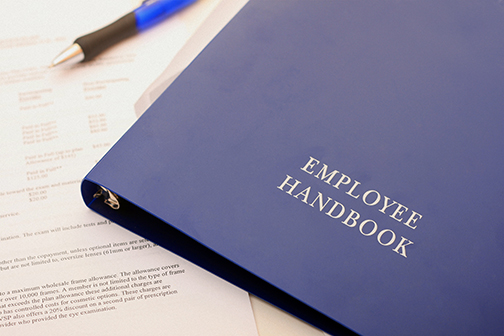Call Don today: 951-533-4966
Even Small Businesses Need Written HR Policies

I have often heard owners of small businesses say that their firm is too small to need written human resources (HR) policies. After all, their three employees are all “like family,” so the formality of written rules and regulations seems a bit absurd. Until, that is, something that an employee handbook could have enabled them to avoid goes wrong, and they pay the price for their laxness in terms of lawsuits, fines, morale problems and more.
The reality is, every employer should have written HR policies in place. These policies clearly communicate the benefits that the company offers, and clearly communicate rules and expectations to everyone so that they can be enforced evenly and fairly. They help protect the employer from employment-related lawsuits, and help ensure compliance with governmental regulations. In short, they’re a good idea.
How to create written HR policies
Luckily, getting a basic employee handbook in place is easier than you might think. The key is to avoid starting from scratch. There are a wide variety of customizable employee handbook templates and creation tools available online. Your trade association may have one as well. Just be sure to choose a template that is in compliance with the latest labor laws and appropriate for the specifics of your industry and state.
What should your employee handbook include?
While the following is not an exhaustive list, at a minimum your employee handbook should include:
• A brief explanation of what your company does, including your vision and mission.
• Standards of acceptable behavior, such as policies regarding work hours, breaks, overtime, dress code, absences and substance abuse.
• Safety-related rules, especially those needed to comply with OSHA or other regulations.
• Anti-harassment policies (including sexual harassment), the process for lodging a complaint, and your process for responding to complaints.
• Rules regulating the use of company computers, personal cell phones, internet access, and other things related to the use of electronics.
• Consequences for breaking the rules. What warrants immediate firing? What is your discipline process?
• Company-paid benefits, including holidays, vacations, sick pay, family medical leave, medical insurance, etc. For paid time off you should explain how the benefit is calculated and the process for scheduling and taking it.
• Policies regarding performance reviews.
If you need help getting an employee handbook in place, give me a call. As your on-call CFO, this is one of the many services I provide.